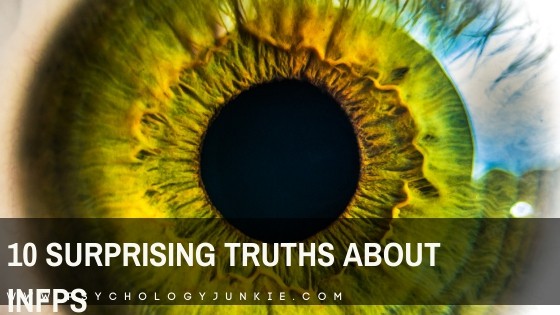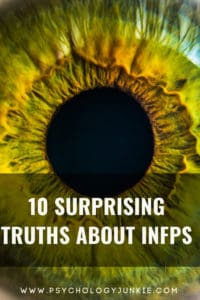10 Surprising Truths About INFPs
Do you want to get a glimpse of some of the lesser-known qualities of the INFP personality type? When I first started studying type over fifteen years ago I read a lot of articles that said the same things over and over again. I’ve been in forums where stereotypes abounded, most of which weren’t grounded in true personality theory. There is a lot of information about type that isn’t widely known, much of which can be found in the official MBTI® Manual. Here are some of the more uncommon facts about the INFP personality type. Keep in mind, a lot of these facts are the result of statistical findings and won’t relate to every single INFP.
“It is only with the heart that one can see rightly; what is essential is invisible to the eye.”
– Antoine de Saint-Exupery
Not sure what your personality type is? Take our new personality questionnaire here. Or you can take the official MBTI® here.
This post contains affiliate links. I only recommend products I truly believe in.
-
INFPs Are the Best Listeners
Did you know that INFPs have a special way of listening to people? As per Dario Nardi, a neuroscience expert at UCLA, INFPs utilize every part of their neocortex when listening to someone else. This is what we call “holistic” listening. (Neuroscience of Personality, page 118) During this process, all regions of their brain are alert, calm, and ready to absorb information. Rather than rushing to formulate a response or letting their minds drift off, INFPs remain patient, continuing to listen for as long as they can. This unique approach lets them gain a rich, detailed understanding of a person’s psychology.
-
INFPs Excel at Learning Foreign Languages
Dario Nardi, again, reveals insights about INFPs! He found in his studies that INFPs tend to have hyperactive regions in their brain that handle language intricacies such as diction, grammar, and voice tone. He further noted that individuals with Introverted Feeling “listen with precision and insight. In other words, they have a keen ear for the subtleties of language and communication (Neuroscience of Personality, page 118 & 119) .
-
INFPs Favored Leisure Activities are Writing, Reading, Appreciating Art, and Listening to Music
The MBTI® Manual states that INFPs favorite leisure-time activities were writing, reading, art, and music. This one may not be especially surprising, considering you’d be hard-pressed to find an INFP without an extensive library!
-
INFPs Prefer Art, English, and Music in School
The creative arts are where INFPs shine. This is no surprise considering some of our greatest authors and artists are INFPs. Antoine de Saint-Exupery, A.A. Milne, Edgar Allan Poe, and J.R.R. Tolkien are just a few INFP authors. Vincent Van Gogh was an INFP painter.
-
INFPs are Hardly Over-Sensitive Crybabies
Somehow this idea has abounded across the type world, and it is one of the most inaccurate stereotypes about INFPs. INFPs wear their feelings on the inside and are usually less easy-to-read on the outside. In fact, they can look quite stoic at first glance. They are also hardly “weak.” In many cases, INFPs are the ones who are willing to stand up and fight for a cause they believe in, even if it’s unpopular. Remember, Joan of Arc was an INFP!
-
Chances Are, INFPs Don’t Look Like “Feelers”
INFPs keep their emotions and feelings tucked away and hidden from the outside world. They view their values and feelings as private and guard them closely. In fact, most typology books describe Fi-dominant types as appearing “aloof, cool” or “hard to read”. Even though INFPs have such strong personal values and emotions they will only allow a select few to see them.
-
INFPs Often Pursue Careers That Go Against Their Desires
According to the MBTI® Manual, INFPs feel confident and perform well in artistic activities. However, they tend to choose conventional careers. The manual states, “Performing the opposite activities from what one likes may be creating the tension that leads them to lower levels of satisfaction overall.” With INTPs, INFPs were dissatisfied most out of the 16 types with the kind of work they do, where they work, and future work opportunities.
-
INFPs Make Up 2% of the U.S. Population
Making them the third rarest type in the U.S. Source
-
INFPs are the Most Likely of All the Types of Report Suicidal Thoughts in College (Source: MBTI® Manual – Third Edition)
As to why this occurs, it may have to do with the persistent feeling many INFPs have of being misunderstood. They have very deep feelings and values, yet they are very private about them and they can lead lonely lives if they don’t find a confidante they trust very deeply. Their imaginative, intuitive ideas may also be met with skepticism by a largely sensor-dominated population. The INFP Idealist blogger states, “Probably for most INFPs, suicidal thoughts have something to do with other people’s expectations, with lack of money, with the feeling of being out of place in this world, with the lack of energy for a job.”
-
New Zealand Has the Largest Percentage of INFPs
I’m not exactly sure why this is, but they make up 4.2% of the New Zealand population. In fact, in New Zealand there is a larger percentage of introverted and intuitive types overall!
The INFP and Stress
Did you enjoy this article?
Find out more about your personality type in our eBooks, Discovering You: Unlocking the Power of Personality Type, The INFJ – Understanding the Mystic, and The INFP – Understanding the Dreamer. You can also connect with me via Facebook, Instagram, or Twitter!
The Childhood Struggles of INFPs
Sources:
MBTI Manual: A Guide to the Development and Use of the Myers-Briggs Type Indicator, 3rd Edition
Neuroscience of Personality: Brain Savvy Insights for All Types of People

















I would love to know why exactly New Zealand has the most INFP’s. That’s intriguing.
Maybe I’ll have to move there and find out 🙂 I’m going to try to research it!
Maybe the country’s pastoral, laid-back, peaceful, and “free from the world’s abnormalities” ambiance attracts the idealists.
New Zealand is basically the Shire, no wonder INFPs like it there. 😉 I knew there was a reason I feel like I belong there.
on point number 7, why the hell it really happened hahaha. I choose art study last year and decided to drop out and move to politics. I feel very confident on Arts but curious in politics. hell yeah. I need explanation on why it happens
Eventhough, I am an info, I differ towards science and the universe excited me. It’s not like I hate music and reading. I just don’t know about a lot of infp scientists. Am I leaning towards an unsuitable career for me. Cause I really like science, but everywhere I read about info’s it says the opposite.
I’m the same! I often questioned if I am truly an INFP because I prefer health sciences and being out in nature rather than creating art, reading, and writing. Although, I do enjoy those things sometimes, I am much more fulfilled by learning about and discussing scientific topics.
It seems like INFP’s need to really care about what they’re doing in their careers. If you’re interested in science and see it as important then it makes sense to follow that instinct. I’ve read about many INFPs that are engineers who love their jobs, I followed my health sciences instinct too.
If we as INFP’s do anything, we hold all emotion in until we are in the comfort of someone we trust, or by ourselves. We are not criers or drama queens.
It’s so accurate. I’m shocked.
Nice article, funny thing is that ever since I was a child, I wanted to live in NZ. I must have felt the infp vibes from thousands of miles away…
Also, I never considered myself to be a good listener, because I usually know what people are going to say, lol. Maybe I should just allow them to talk anyway so that they think I’m a good listener
Im INFP, live in NZ and still feel very isolated and misunderstood by my peers so I do find that fact hard to believe
I know how you feel. It seems lonely when all your ideals look like they can only be dreams but I know that someday we’re going to make something happen, something big.
This was so accurate! I was actually shocked to read the part about INFPs usually being very good at foreign languages, because I did not expect to see that kind of thing in an INFP article, but it is definitely true of me. I have a natural ear for languages and music.
Unfortunately I don’t catch languages so fast. I do catch accents quite well but, I don’t know if I will ever be able to learn languages well.
I am a fan of music to an extent too.